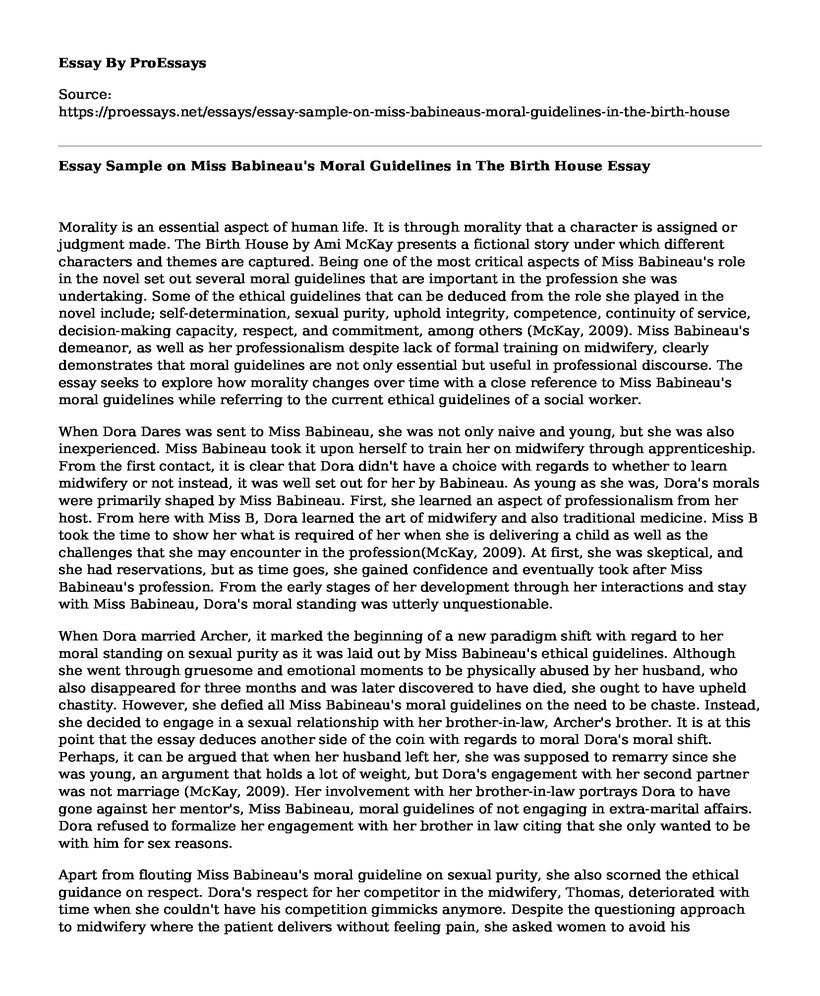Morality is an essential aspect of human life. It is through morality that a character is assigned or judgment made. The Birth House by Ami McKay presents a fictional story under which different characters and themes are captured. Being one of the most critical aspects of Miss Babineau's role in the novel set out several moral guidelines that are important in the profession she was undertaking. Some of the ethical guidelines that can be deduced from the role she played in the novel include; self-determination, sexual purity, uphold integrity, competence, continuity of service, decision-making capacity, respect, and commitment, among others (McKay, 2009). Miss Babineau's demeanor, as well as her professionalism despite lack of formal training on midwifery, clearly demonstrates that moral guidelines are not only essential but useful in professional discourse. The essay seeks to explore how morality changes over time with a close reference to Miss Babineau's moral guidelines while referring to the current ethical guidelines of a social worker.
When Dora Dares was sent to Miss Babineau, she was not only naive and young, but she was also inexperienced. Miss Babineau took it upon herself to train her on midwifery through apprenticeship. From the first contact, it is clear that Dora didn't have a choice with regards to whether to learn midwifery or not instead, it was well set out for her by Babineau. As young as she was, Dora's morals were primarily shaped by Miss Babineau. First, she learned an aspect of professionalism from her host. From here with Miss B, Dora learned the art of midwifery and also traditional medicine. Miss B took the time to show her what is required of her when she is delivering a child as well as the challenges that she may encounter in the profession(McKay, 2009). At first, she was skeptical, and she had reservations, but as time goes, she gained confidence and eventually took after Miss Babineau's profession. From the early stages of her development through her interactions and stay with Miss Babineau, Dora's moral standing was utterly unquestionable.
When Dora married Archer, it marked the beginning of a new paradigm shift with regard to her moral standing on sexual purity as it was laid out by Miss Babineau's ethical guidelines. Although she went through gruesome and emotional moments to be physically abused by her husband, who also disappeared for three months and was later discovered to have died, she ought to have upheld chastity. However, she defied all Miss Babineau's moral guidelines on the need to be chaste. Instead, she decided to engage in a sexual relationship with her brother-in-law, Archer's brother. It is at this point that the essay deduces another side of the coin with regards to moral Dora's moral shift. Perhaps, it can be argued that when her husband left her, she was supposed to remarry since she was young, an argument that holds a lot of weight, but Dora's engagement with her second partner was not marriage (McKay, 2009). Her involvement with her brother-in-law portrays Dora to have gone against her mentor's, Miss Babineau, moral guidelines of not engaging in extra-marital affairs. Dora refused to formalize her engagement with her brother in law citing that she only wanted to be with him for sex reasons.
Apart from flouting Miss Babineau's moral guideline on sexual purity, she also scorned the ethical guidance on respect. Dora's respect for her competitor in the midwifery, Thomas, deteriorated with time when she couldn't have his competition gimmicks anymore. Despite the questioning approach to midwifery where the patient delivers without feeling pain, she asked women to avoid his maternity, claiming that it was only interesting on the bills. Dora's moral revolution from the time she went to Miss Babineau's place to the time she took up midwifery after Miss Babineau's death portrays two sides of the coin. The other moral guidelines that Miss Babineau described, such as competence, continuity, of service, decisiveness, self-determination, and commitment, compares with the current ethical guidelines for social workers. Social workers are expected not to engage in a sexual relationship with their clients or their colleagues. Equally, they are supposed to be committed to the course of social work. They should not mix their duties or responsibilities with other things; instead, they should stay on course. On the same note, the social workers are expected to be people of unquestionable character (McKay, 2009). They should uphold integrity every time they are delivering on their mandate. In supporting the highest levels of integrity, the social workers must avoid conflicts of interest whereby they find themselves in unfamiliar situations. In summary, Miss Babineau's moral guidelines not only apply to social work professionals, but they are also crucial for anyone who wants to develop an unquestionable legacy in society. Dora's moral revolution indicates that a wrong, noble ruins professionalism. The social workers have a lot of lesson that they can learn from Dora and Miss Babineau. Bu the bottom line is that they have to uphold the highest moral standards when they are delivering their mandate.
References
McKay, A. (2009). The birth house. Seal Books.
Cite this page
Essay Sample on Miss Babineau's Moral Guidelines in The Birth House. (2023, Mar 12). Retrieved from https://proessays.net/essays/essay-sample-on-miss-babineaus-moral-guidelines-in-the-birth-house
If you are the original author of this essay and no longer wish to have it published on the ProEssays website, please click below to request its removal:
- Analyzing the Arguments of Mercer and Kalden in the Circle. Literary Essay Example.
- To Kill a Mockingbird: Metaphor Analysis Essay
- The Role of the Narrator in Harper Lee's To Kill a Mockingbird: Literary Analysis Essay
- Research Paper on Feminism and Marxism in the Brave New World
- Poetry Analysis Essay on Images of Hope in Alfred Prufrock in 'The Love Song' by T.S.Eliot
- I Hear America Singing by Walt Whitman - Poetry Analysis Essay
- Nawal El Saadawi Biography and Writings Essay Example







